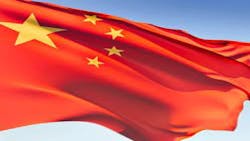China Industrial Growth Slows, But Auto Sales Hit Record
BEIJING -- Growth in China's industrial production slowed in November but retail sales expanded at a faster pace, official figures showed Tuesday, painting a mixed picture of the world's second-largest economy.
Industrial output, which measures production at factories, workshops and mines, rose 10% in November year-on-year, the National Bureau of Statistics announced.That was a slowdown from the 10.3% expansion recorded in October.
Retail sales rose 13.7% in November from the year before -- an acceleration from the 13.3% registered in October.
Separately, an industry group announced Tuesday that auto sales in China, the world's largest car market, rose 14.1% year-on-year to a record high in November.
Citing solid demand for passenger vehicles, the China Association of Automobile Manufacturers said that a total of 2.04 million vehicles were sold in China last month.
The various November data followed publication of strong export and benign inflation figures for the month as China's economy -- a driver of global and regional growth -- shows signs of strength after a slump in the first half of the year.
Gross domestic product expanded 7.8% year-on-year in July-September, snapping a two-quarter slowdown, with data for the final three months of the year so far suggesting a steady outlook.
Figures on Monday showed inflation slowed to 3% in November, after two months of acceleration in consumer prices, well under the government's target for the year of 3.5%.
On Sunday the General Administration of Customs said exports accelerated 12.7% year-on-year in November while import growth weakened, resulting in the country's biggest trade surplus in nearly five years.
But the strong export figure led some economists to wonder whether companies had returned to over-invoicing their overseas sales to camouflage capital flows, a phenomenon seen earlier this year.
"The export growth according to (the) industrial survey only grew by 5.8%, which reinforces our view that double-digit export growth in November likely reflects to some extent capital flows disguised as trade flows," Nomura International economist Zhang Zhiwei said.
China's leaders say they aim to move the economy away from dependence on big-ticket investment and want consumer demand to become the key growth engine.
Also Tuesday the statistical bureau said fixed-asset investment, a measure of government spending on infrastructure, expanded 19.9% year-on-year in the first 11 months of 2013. That compared with an increase of 20.1% for the first 10 months.
Authorities are targeting overall economic growth this year of 7.5%, the same as the objective for 2012. Speculation is increasingly focused on whether officials may lower it to 7% for 2014.
China sees annual growth in the seven percent range as being more sustainable for the future as the economy matures. As recently as 2010 GDP grew 10.4%, and the following year it expanded 9.3%.
-Kelly Olsen, APF
Copyright Agence France-Presse, 2013
About the Author
Agence France-Presse
Copyright Agence France-Presse, 2002-2025. AFP text, photos, graphics and logos shall not be reproduced, published, broadcast, rewritten for broadcast or publication or redistributed directly or indirectly in any medium. AFP shall not be held liable for any delays, inaccuracies, errors or omissions in any AFP content, or for any actions taken in consequence.
